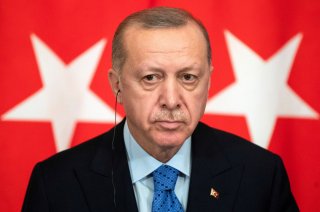More S-400s? Is Turkey Moving Closer to Russia Again?
The two countries are reportedly at an advanced stage of talks for the delivery of the second regiment set of S-400 “Triumf” anti-aircraft missile systems to Ankara. Moreover, Russia is apparently ready to discuss the possibility of technological cooperation with Turkey, which could imply the participation of Turkish companies.
Turkey and Russia have had what only can be described as a “unique” relationship. The two nations fought a series of wars in the 19th century, which saw the former gradually lose territory to the latter. For centuries Imperial Russia eyed Constantinople (modern Istanbul) as the Czars saw themselves as de facto successors of the Byzantine Empire and the two powers fought a bloody campaign against one another in the Caucus region during the First World War.
After World War I, following the fall of the Ottoman Empire, a modern Turkey established relations with the Soviet Union—in part because the Bolshevik government under Vladimir Lenin abdicated the traditional claims to the territories of Western Armenia and Constantinople. Moreover, it was the supply of Soviet weapons that helped Mustafa Kemal (Kemal Ataturk), the father of modern Turkey, secure power and defeat the Greeks in the Greco-Turkish War.
The situation became more complicated after the Second World War, when the Soviets withdrew from the 1925 Non-Aggression Pact. Turkey joined NATO in 1952 but had also sent soldiers to join the UN forces in the Korean War.
If the situation was difficult previously, it is downright perplexing now, as Turkish President Recep Erdogan seemingly continues to reach out to both sides.
Just this week, Russian state media has reported that Turkey’s orders for Russian military equipment are estimated at about $1 billion.
“Today we can say that Turkey’s orders for Russian military equipment stand at a total of $1 billion,” Dmitry Shugayev, chief of Russia’s federal service for military-technological cooperation, told Turkish television broadcaster Ekoturk on Tuesday as reported by TASS. “We have a firm basis and a good potential for further steady progress in development and cooperation in the military sphere.”
The two countries are reportedly at an advanced stage of talks for the delivery of the second regiment set of S-400 “Triumf” anti-aircraft missile systems to Ankara. Moreover, Russia is apparently ready to discuss the possibility of technological cooperation with Turkey, which could imply the participation of Turkish companies.
“The negotiations [on this issue] are underway but this is a time-consuming process that takes certain time. But considering the current restrictions over the pandemic, it is quite difficult to predict the time of concluding this contract,” Shugayev told Tass this week.
It was in September 2017 that Russia had first announced it had signed a $2.5 billion deal with Turkey on the delivery of the S-400 anti-aircraft system. Under the contract, the Turkish military received a regiment set of S-400 air defense missile systems (two battalions), along with the partial transfer of production technology.
The Russian S-400 long-range surface-to-air missile system was designed to address a range of aerial targets including aircraft, cruise missiles and ballistic missiles, and it can also be used against ground installations. The S-400 has a range of 400km and can engage targets at an altitude of up to 30km.
Buyers and potential buyers of the system include China, India, Saudi Arabia and Qatar. However, Turkey, which has the second-largest military force in NATO, is also the only NATO member to purchase the Russian-built systems. U.S. lawmakers have warned Ankara that the purchase of the S-400 would have a severe and lasting impact on bilateral relations.
As a result of the purchase of the Russian military hardware, Turkey—despite being a NATO ally—was suspended from the U.S. military’s F-35 Joint Strike Fighter program, while the United States also has threatened Turkey with unilateral sanctions. Fearing such actions, Turkey has even stockpiled parts for its U.S.-built F-16s and other military equipment.
Despite being suspended from the F-35 program, Turkish-based subcontractors were still producing and delivering parts for the Joint Strike Fighter as late as April.
Now with Turkey out of that program, the question is whether Turkey would consider an F-35 alternative. Tass reported that in August 2019, a Turkish delegation led by President Erdogan examined Russia’s fighter jets Sukhoi-35 and Sukhoi-57 at the international aerospace show MAKS-2019 in Zhukovsky, near Moscow.
The situation apparently will continue to be a complicated one.
Peter Suciu is a Michigan-based writer who has contributed to more than four dozen magazines, newspapers and websites. He is the author of several books on military headgear including A Gallery of Military Headdress, which is available on Amazon.com.
Image: Reuters

